Related Research Articles
Same-sex marriage has been legal in Florida since January 6,2015,as a result of a ruling in Brenner v. Scott from the U.S. District Court for the Northern District of Florida. The court ruled the state's same-sex marriage ban unconstitutional on August 21,2014. The order was stayed temporarily. State attempts at extending the stay failed,with the U.S. Supreme Court denying further extension on December 19,2014. In addition,a state court ruling in Pareto v. Ruvin allowed same-sex couples to obtain marriage licenses in Miami-Dade County on the afternoon of January 5,2015. In another state case challenging the state's denial of marriage rights to same-sex couples,a Monroe County court in Huntsman v. Heavilin stayed enforcement of its decision pending appeal and the stay expired on January 6,2015.

Reed Charles O'Connor is a United States district judge of the United States District Court for the Northern District of Texas. He was nominated by President George W. Bush in 2007.
Aleta Mae Grillos Arthur Trauger is a United States district judge of the United States District Court for the Middle District of Tennessee. As of May 1,2024,her rulings have set 117 precedents of case law.
In the United States,the rights of transgender people vary considerably by jurisdiction. In recent decades,there has been an expansion of federal,state,and local laws and rulings to protect transgender Americans;however,many rights remain unprotected,and some rights are being eroded. Since 2020,there has been a national movement by conservative/right-wing politicians and organizations to target transgender rights. There has been a steady increase in the number of anti-transgender bills introduced each year,especially in Republican-led states.

Lesbian,gay,bisexual,and transgender (LGBT) people in the U.S. state of Florida have federal protections,but many face legal difficulties on the state level that are not experienced by non-LGBT residents. Same-sex sexual activity became legal in the state after the U.S. Supreme Court's decision in Lawrence v. Texas on June 26,2003,although the state legislature has not repealed its sodomy law. Same-sex marriage has been legal in the state since January 6,2015. Discrimination on account of sexual orientation and gender identity in employment,housing and public accommodations is outlawed following the U.S. Supreme Court's ruling in Bostock v. Clayton County. In addition,several cities and counties,comprising about 55 percent of Florida's population,have enacted anti-discrimination ordinances. These include Jacksonville,Miami,Tampa,Orlando,St. Petersburg,Tallahassee and West Palm Beach,among others. Conversion therapy is also banned in a number of cities in the state,mainly in the Miami metropolitan area,but has been struck down by the 11th Circuit Court of Appeals. In September 2023,Lake Worth Beach,Florida became an official "LGBT sanctuary city" to protect and defend LGBT rights.
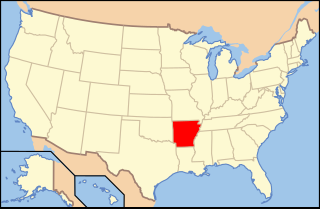
Lesbian,gay,bisexual,and transgender (LGBT) people in the U.S. state of Arkansas face legal challenges not experienced by non-LGBT residents. Same-sex sexual activity is legal in Arkansas. Same-sex marriage became briefly legal through a court ruling on May 9,2014,subject to court stays and appeals. In June 2015,the U.S. Supreme Court ruled in Obergefell v. Hodges that laws banning same-sex marriage are unconstitutional,legalizing same-sex marriage in the United States nationwide including in Arkansas. Nonetheless,discrimination on the basis of sexual orientation and gender identity was not banned in Arkansas until the Supreme Court banned it nationwide in Bostock v. Clayton County in 2020.

Lesbian,gay,bisexual,and transgender (LGBT) rights in the U.S. state of Indiana have been shaped by both state and federal law. These evolved from harsh penalties established early in the state's history to the decriminalization of same-sex activity in 1977 and the legalization of same-sex marriage in 2014. Indiana was subject to a April 2017 federal court ruling that discrimination based on sexual orientation is tantamount to discrimination on account of "sex",as defined by the Civil Rights Act of 1964. The ruling establishes sexual orientation as a protected characteristic in the workplace,forbidding unfair discrimination,although Indiana state statutes do not include sexual orientation or gender identity among its categories of discrimination.
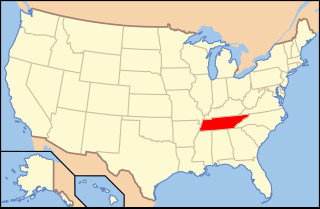
Lesbian,gay,bisexual,and transgender (LGBT) people in Tennessee may experience some legal challenges that non-LGBT residents do not. Same-sex sexual activity has been legal in the state since 1996. Marriage licenses have been issued to same-sex couples in Tennessee since the Supreme Court ruling in Obergefell v. Hodges on June 26,2015.
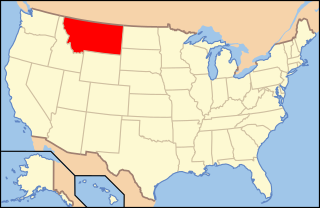
Lesbian,gay,bisexual,and transgender (LGBT) people in the U.S. state of Montana may face some legal challenges not experienced by non-LGBT residents. Same-sex sexual activity has been legal in Montana since 1997. Same-sex couples and families headed by same-sex couples are eligible for all of the protections available to opposite-sex married couples,as same-sex marriage has been recognized since November 2014. State statutes do not address discrimination on the basis of sexual orientation and gender identity;however,the U.S. Supreme Court's ruling in Bostock v. Clayton County established that employment discrimination against LGBT people is illegal under federal law. A number of cities also provide protections in housing and public accommodations.

Lesbian,gay,bisexual,and transgender (LGBT) people in the U.S. state of Mississippi face legal challenges and discrimination not experienced by non-LGBT residents. LGBT rights in Mississippi are limited in comparison to other states. Same-sex sexual activity is legal in Mississippi as a result of the U.S. Supreme Court decision in Lawrence v. Texas. Same-sex marriage has been recognized since June 2015 in accordance with the Supreme Court's decision in Obergefell v. Hodges. State statutes do not address discrimination on the basis of sexual orientation and gender identity;however,the U.S. Supreme Court's ruling in Bostock v. Clayton County established that employment discrimination against LGBT people is illegal under federal law. The state capital Jackson and a number of other cities provide protections in housing and public accommodations as well.
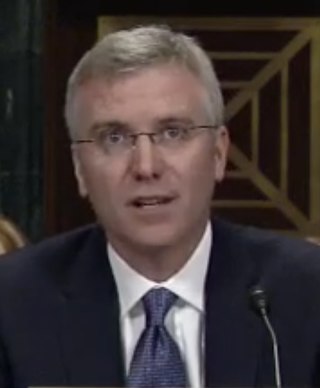
Mark Eaton Walker is the chief United States district judge of the United States District Court for the Northern District of Florida.
This is a list of notable events in the history of LGBT rights that took place in the year 2014.

De Leon v. Perry was a federal lawsuit challenging Texas marriage law,specifically the state's constitutional ban on same-sex marriage and corresponding statutes. A U.S. district court ruled in favor of the plaintiff same-sex couples on February 26,2014,granting their motion for a preliminary injunction. The state defendants filed an interlocutory appeal before the United States Court of Appeals for the Fifth Circuit,as the disposition on the motion was not a final ruling in the case. On April 14,2014,the plaintiffs filed a motion for an expedited hearing,which was denied on May 21,2014. The plaintiffs filed another motion for an expedited hearing on October 6,2014,after the Supreme Court of the United States denied appeals in other marriage equality cases,and the motion was granted on October 7,2014,setting a hearing for November 2014. However,on October 27,2014,the Fifth Circuit set oral arguments for January 9,2015.
In Brenner v. Scott and its companion case,Grimsley v. Scott,a U.S. district court found Florida's constitutional and statutory bans on same-sex marriage unconstitutional. On August 21,2014,the court issued a preliminary injunction that prevented that state from enforcing its bans and then stayed its injunction until stays were lifted in the three same-sex marriage cases then petitioning for a writ of certiorari in the U.S. Supreme Court–Bostic,Bishop,and Kitchen–and for 91 days thereafter. When the district court's preliminary injunction took effect on January 6,2015,enforcement of Florida's bans on same-sex marriage ended.

G.G. v. Gloucester County School Board was a court case dealing with transgender rights in the United States. The case involved a transgender boy attending a Virginia high school,who sued the local school board after he was forced to use girls' restrooms based on his assigned gender under the school board's policy. While the Fourth Circuit ruled in favor of the student based on Obama administration policy related to Title IX protections,the election of Donald Trump changed the underlying policy. A pending hearing before the Supreme Court of the United States was vacated and the case was sent back to the Fourth Circuit.
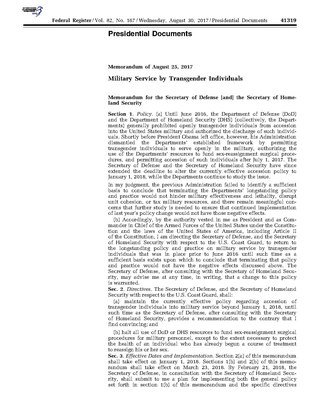
The Presidential Memorandum on Military Service by Transgender Individuals,officially the Presidential Memorandum for the Secretary of Defense and the Secretary of Homeland Security,is the 27th presidential memorandum signed by U.S. President Donald Trump on August 25,2017. The intent was to prevent transgender people from serving in the U.S. military,on the basis that they would be a financial burden due to sex reassignment procedures and associated costs. Federal courts delayed the implementation of this rule by issuing four injunctions. On January 22,2019,however,the U.S. Supreme Court allowed the Trump administration's ban to take effect.

Florida Amendment 4,also the Voting Rights Restoration for Felons Initiative,is an amendment to the constitution of the U.S. state of Florida passed by ballot initiative on November 6,2018,as part of the 2018 Florida elections. The proposition restored the voting rights of Floridians with felony convictions after they complete all terms of their sentence including parole or probation. The amendment does not apply to Floridians convicted of murder or sexual offenses.
NetChoice is a trade association of online businesses that advocates for free expression and free enterprise on the internet. It currently has six active First Amendment lawsuits over state-level internet regulations,including NetChoice v. Paxton,Moody v. NetChoice,NetChoice v. Bonta and NetChoice v. Yost.

Florida Senate Bill 254 is a law that prohibits gender-affirming care for anyone under the age of 18,places restrictions on adult patients accessing this care,and allows the state to take temporary custody of children who may be receiving gender-affirming care now or in the future. In June 2024,a judge permanently blocked the law from taking effect.
United States v. Skrmetti is a pending United States Supreme Court case on whether bans on gender affirming care violate the Equal Protection Clause of the Fourteenth Amendment to the United States Constitution.
References
- ↑ "Mr Robert John Hinkle - Yakima, Washington". www.familytreenow.com.
- ↑ Robert Hinkle at the Biographical Directory of Federal Judges , a publication of the Federal Judicial Center .
- ↑ Sweeney, Dan (August 21, 2014). "Same-sex marriage ban struck down in Florida federal court". Sun-Sentinel. Retrieved August 21, 2014.
- ↑ Snow, Justin (August 21, 2014). "Federal judge rules Florida same-sex marriage ban unconstitutional". Metro Weekly. Retrieved August 21, 2014.
- 1 2 "Judge rules against Florida on felons paying fines to vote". Miami Herald . Associated Press. May 24, 2020. Retrieved May 26, 2020.
- ↑ "Judges: Florida felons can't vote until they pay fines, fees". ABC News .
- ↑ "The Real Takeaway From the Enjoining of the Florida Social Media Law". Lawfare. 2021-07-09. Retrieved 2021-07-10.
- ↑ "Federal judge blocks Florida ban on gender-affirming care for minors in narrow ruling, says 'gender identity is real'". PBS NewsHour. 2023-06-06. Retrieved 2023-06-06.
- ↑ "A Florida law blocking treatment for transgender children is thrown out by a federal judge". Associated Press. 2024-06-11. Retrieved 2024-06-11.
- ↑ "ORDER ON THE MERITS in JANE DOE et al. vs JOSEPH A. LADAPO et al., Case4:23cv114-RH-MAF" (PDF). CourtListener. 2024-06-11. Retrieved 2024-06-11.